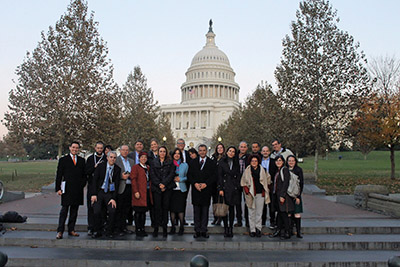
(Courtesy of Gesher) This past Sunday marked the final day of an intense, seven-day trip where leaders in Israeli society could meet, learn from and engage with the American Jewish community. This latest trip is the fourth such trip to the US as part of Project Community, a joint effort of Gesher (www.gesherusa.org) and Israel’s Ministry of Diaspora Affairs. Recently, The Steinhardt Foundation joined the effort as well.
The goal of the trip, which is the climax of a two-month course, is to afford these leaders the opportunity to get to know the American Jewish community from many different angles. Much ink has been spilled on the widening gap between the two largest communities in the world, and much of it has to do with a lack of intimacy between the communities.
In Washington, the group met with Jewish politicians on Capitol Hill including Brad Schneider (D-Ill.) and lobbyist groups as well as leading organizations such as AIPAC; JCRC; J-Street; and GatherDC, an organization focused on connecting Jewish singles in the nation’s capital.
The group then moved on to New York. They interacted with leaders such as Eric Goldstein, the CEO of the UJA Federation of New York, and Rabbis Elliot Cosgrove, Saul Berman and Meir Soloveitchik. They heard from students at NYU about the challenges they face on campus, and had a joint event with the participants in OneTable, an innovative organization engaging thousands of millennials around the concept of Shabbat. They visited the Harlem Hebrew Charter School and were treated to a panel about how the Hebrew language is being used as a way to engage the next generation.
After spending a Shabbat on New York’s Upper West Side, the group visited the JCC and then had an eye-opening conversation with leaders from the Israel American Council (IAC) about how the Israelis living in the US are beginning to organize as a community in large numbers.
By the end of the week, the Israeli leaders began to understand the vibrancy and challenges facing today’s Jews in America. They heard about some of the positives in the US-Israel relationship but also about the many problems facing this crucial bond. Upon returning to Israel, these leaders will use their spheres of influence to continue to focus on this important relationship.
The group comprised Haredim, Hilonim and religious leaders from Israel. They included senior journalists from YNET, Galei Tzahal and Arutz Sheva, the mayors of Tiberias and Beit Shean, the deputy mayor of Modiin, some heads of NGOs in the educational sector and leading businessmen.










